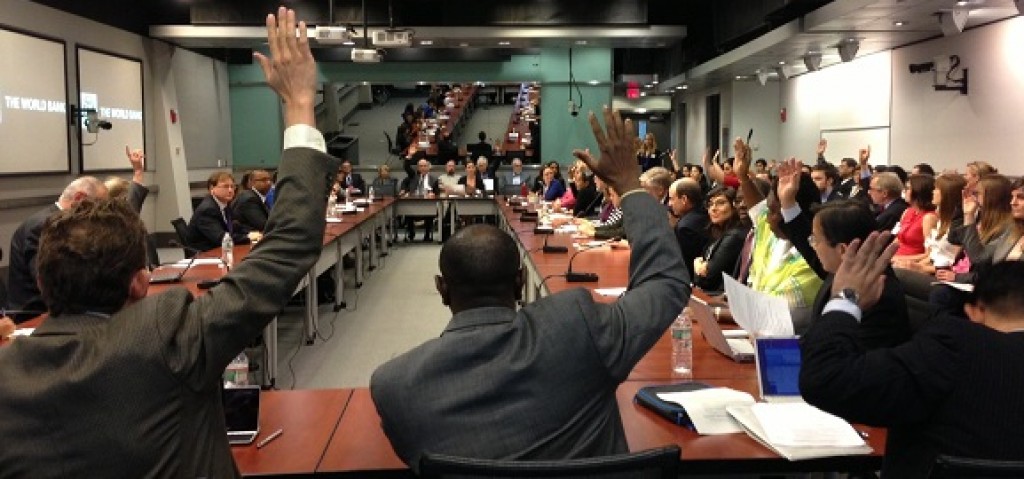
While neither the World Bank nor its Inspection Panel are perfect, the elements that make the Panel successful in enforcing environmental standards in development projects may teach us lessons for creating effective environmental dispute resolution mechanisms in the trade arena as well.
The Panel was created through an advocacy effort by members of civil society, and has resolved 92 cases since its operations began in 1994. This statistic shows civil society’s extensive engagement with it as an effective enforcement mechanism. Almost 20 mechanisms have been modeled after it in other international development banks and bilateral investment banks.
Why is the Panel successful at enforcing environmental standards?
The Panel reviews projects according to environmental standards embodied in the World Bank’s environmental and social safeguard policies. The Panel’s investigations provide an opportunity for the Bank management to engage with those communities whose lives have become worse, rather than better, from the involvement of the World Bank. After it investigates a Bank project that is or was harmful to the environment, the Panel publishes public reports identifying how the Bank’s policies were not implemented correctly.
The institutional structure of the Panel allows it to operate independently of World Bank or political interests. The Panel is made up of three individuals who have selected for their experience and independence by the World Bank’s Board of Directors. Panel members are independent from other World Bank operations, and cannot work for the World Bank for the two years before their appointment or anytime after their appointment. The Panel also circumvents the problem of political will by allowing independent and individual groups to lodge complaints directly with the Panel instead of going through government agencies.
Last, and perhaps most importantly, the Panel operates off of an adequate budget, which gives it the personnel, time, physical and financial resources to analyze cases effectively.
Efforts to weaken the Inspection Panel
However, there is a current trend towards weakening strong mechanisms like the Panel. World Bank management is proposing reforms that threaten to strip the Panel of the tools and structure that make it independent and reliable, and turn it into a weak “green-washed” complaint mechanism like those of the North America Free Trade Agreement, Commission on Economic Cooperation and US-Peru Free Trade Agreement mechanisms.
One such proposal is to resolve disputes with communities through less independent means. Of particular concern is the proposal to solve communities’ complaints by letting affected communities and corporations “negotiate” a settled dispute with minimal oversight by the Panel. Given the imbalance of power between these two actors, it is almost impossible that this will have a just outcome in most cases.
When an affected community files a complaint alleging violations of the World Bank’s environmental and social safeguards, the Panel is required to investigate the complaint. The World Bank management is then required to propose a way to fix the problem. Lately, though, instead of spending its energy trying to fix the problem, the Bank spends its resources on denying there is one or that it’s responsible.
Lastly, recent proposals also threaten to diminish the budget that enables the Bank to conduct independent investigations and publish thorough reports.
Who is trying to weaken the Panel, and why?
For World Bankers who are rewarded and incentivized by how much money they get out the door, many see the accountability function as a burden on their time and resources.
The million dollar question: Why do we trade? Why do we invest money into development projects?
The World Bank Inspection Panel symbolizes the response that trade and development have goals much larger than profit alone. The Panel prioritizes the goal of sustainable development, by ensuring public participation, access to justice – and within access to justice, access to redress and remedy.
Therefore civil society urges that the World Bank Inspection Panel’s tools for enforcing environmental standards are strengthened, not stripped. Furthermore, civil society urges that the Panel’s safeguards also include a requirement to undertake an assessment of human rights risks, ensure consistency between its policies and international law, and adopt an explicit commitment not to fund projects that could cause or contribute to human rights violations.
With even the strongest of dispute resolution mechanisms under fire, it is an important time for citizens and civil society to demand stronger dispute resolution mechanisms as a crucial part of trade and development. Learning from the examples of weak dispute resolution mechanisms in trade agreements, we must ensure that the Panel retains the strength that makes it such a successful dispute resolution mechanism for enforcing environmental and human rights standards for development projects, and we must look to its example in developing such mechanisms in trade agreements.
Originally posted May 2, 2014

